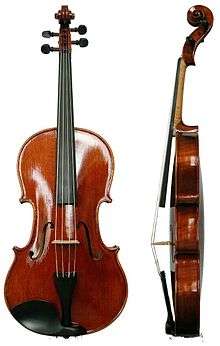Definify.com
Webster 1913 Edition
Viola
Vi′o-la
,Vi′o-la
,Definition 2026
Viola
Viola
Translingual
Etymology
Proper noun
Viola f
- A taxonomic genus within the family Violaceae – the violets.
- A taxonomic genus within the family Hesperiidae – certain of the butterflies called skippers.
Hypernyms
- (violets): Plantae - kingdom; angiosperms, eudicots, core eudicots, rosids, eurosids I - clades; Malpighiales - order; Violaceae - family
Hyponyms
- (violets): See
 List of viola species on Wikipedia.Wikipedia
List of viola species on Wikipedia.Wikipedia
English
Proper noun
Viola
- A female given name
- 1599 William Shakespeare, Twelfth Night, Act V, Scene 1:
- Were you a woman as the rest goes even, / I should my tears let fall upon your cheek, / And say, 'Thrice welcome, drowned Viola!'
- 1599 William Shakespeare, Twelfth Night, Act V, Scene 1:
- A town in Arkansas
- A town in Delaware
- A village in Illinois
- A city in Kansas
- A hamlet in New York
- A town in Tennessee
- A village in Wisconsin
Related terms
Translations
Anagrams
Finnish
Etymology
From Latin viola in the 19th century.
Pronunciation
- IPA(key): /ˈviolɑ/
- Hyphenation: Vi‧o‧la
Proper noun
Viola
- A female given name.
- 1984 Veronica Pimenoff, Loistava Helena, Tammi, ISBN 951-30-6142-6, pages 45-46:
- Helenalle valkeni että Marjatan äidillä oli sama nimi kaksi kertaa: Viola Orvokki. Kuitenkin nimet olivat kuin toistensa vastakohtia: Viola kellanvaaleana sulatejuustopakkauksessa ja toisaalta Orvokkini tummasilmä.
- 1984 Veronica Pimenoff, Loistava Helena, Tammi, ISBN 951-30-6142-6, pages 45-46:
Declension
| Inflection of Viola (Kotus type 9/kala, no gradation) | |||
|---|---|---|---|
| nominative | Viola | Violat | |
| genitive | Violan | Violojen | |
| partitive | Violaa | Violoja | |
| illative | Violaan | Violoihin | |
| singular | plural | ||
| nominative | Viola | Violat | |
| accusative | nom. | Viola | Violat |
| gen. | Violan | ||
| genitive | Violan | Violojen Violainrare |
|
| partitive | Violaa | Violoja | |
| inessive | Violassa | Violoissa | |
| elative | Violasta | Violoista | |
| illative | Violaan | Violoihin | |
| adessive | Violalla | Violoilla | |
| ablative | Violalta | Violoilta | |
| allative | Violalle | Violoille | |
| essive | Violana | Violoina | |
| translative | Violaksi | Violoiksi | |
| instructive | — | Violoin | |
| abessive | Violatta | Violoitta | |
| comitative | — | Violoineen | |
Italian
Etymology
The given name derived from Latin viola (“a violet”). The surname can be matronymic, but more often occupational, for a dyer of violet cloth, or a player of the viola.
Proper noun
Viola ?
- A female given name.
- A surname.
Spanish
Etymology
Occupational surname for a viola player, from Late Latin vitula, or for a dyer or seller of violet fabric.
Proper noun
Viola ?
- A surname.
Swedish
Etymology
From Latin viola (“violet”). First recorded in Sweden in 1844.
Proper noun
Viola
- A female given name.
References
- Roland Otterbjörk: Svenska förnamn, Almqvist & Wiksell 1996, ISBN 91-21-10937-0
- Statistiska centralbyrån and Sture Allén, Staffan Wåhlin, Förnamnsboken, Norstedts 1995, ISBN 9119551622: 57 207 females with the given name Viola living in Sweden on December 31st, 2010, with the frequency peak in the 1910s. Accessed on 19 June 2011.
viola
viola
English

Pronunciation
- (Received Pronunciation) IPA(key): /viˈəʊ.lə/ [1][2]
- (US, Canada) IPA(key): /viˈoʊ.lə/[3]
- Rhymes: -əʊlə
Noun
viola (plural violas)
- (music) A stringed instrument of the violin family, somewhat larger than a violin, played under the chin, and having a deeper tone
- (music) An organ stop having a similar tone
- (music) A 10-string steel-string acoustic guitar, used in Brazilian folk music.
Derived terms
References
- ↑ Oxford Advanced Learner's Dictionary
- ↑ Cambridge Advanced Learner's Dictionary
- ↑ American Heritage Dictionary
Translations
|
|
Etymology 2

Pronunciation
Noun
viola (plural violas)
References
Translations
Anagrams
Catalan
Etymology 1
Noun
viola f (plural violes)
Derived terms
- viola alba (V. alba)
- viola boscana (V. sylvestris)
- viola canina (V. canina)
- viola d'olor or viola vera (V. odorata)
Etymology 2
Uncertain origin, probably from Occitan viula, derivative of viular (“playing a string instrument” or “wind”)
Noun
viola m, f (plural violes)
Synonyms
- (violist): violista
Etymology 3
Noun
viola f (plural violes)
Etymology 4
Verb
viola
- third-person singular present indicative form of violar
- second-person singular imperative form of violar
Esperanto
Adjective
viola (accusative singular violan, plural violaj, accusative plural violajn)
- of or relating to the flower violet
- the color of such flowers, violet
violet colour:
Finnish
Noun
viola
Declension
| Inflection of viola (Kotus type 12/kulkija, no gradation) | |||
|---|---|---|---|
| nominative | viola | violat | |
| genitive | violan | violoiden violoitten |
|
| partitive | violaa | violoita | |
| illative | violaan | violoihin | |
| singular | plural | ||
| nominative | viola | violat | |
| accusative | nom. | viola | violat |
| gen. | violan | ||
| genitive | violan | violoiden violoitten violainrare |
|
| partitive | violaa | violoita | |
| inessive | violassa | violoissa | |
| elative | violasta | violoista | |
| illative | violaan | violoihin | |
| adessive | violalla | violoilla | |
| ablative | violalta | violoilta | |
| allative | violalle | violoille | |
| essive | violana | violoina | |
| translative | violaksi | violoiksi | |
| instructive | — | violoin | |
| abessive | violatta | violoitta | |
| comitative | — | violoineen | |
Anagrams
Italian
Etymology 1
Adjective
viola (invariable)
Synonyms
Noun
viola f (plural viole)
Synonyms
Derived terms
Etymology 2
Possibly from Old Provençal viola (modern Occitan viula), ultimately from Medieval Latin *vitula (“stringed instrument”).
Noun
viola f (plural viole)
Derived terms
- viola da braccio
- viola da gamba
- viola del pensiero
Etymology 3
Verb
viola
See also
| Colors in Italian · colori (layout · text) | ||||
|---|---|---|---|---|
| rosso | verde | giallo | beige | bianco |
| cremisi | magenta | blu petrolio, foglia di tè | limetta | rosa |
| indaco | blu | arancione | grigio | violetta |
| nero | viola | marrone | azzurro | ciano |
Anagrams
Latin
Etymology
Related to Ancient Greek ἴον (íon, “violet”) (from ϝίον). Probably from a pre-I.E. Mediterranean language. See also Middle Persian wnpšk'.
Pronunciation
- (Classical) IPA(key): /ˈwi.o.la/, [ˈwi.ɔ.ɫa]
Noun
viola f (genitive violae); first declension
- violet (flower)
Inflection
First declension.
| Case | Singular | Plural |
|---|---|---|
| nominative | viola | violae |
| genitive | violae | violārum |
| dative | violae | violīs |
| accusative | violam | violās |
| ablative | violā | violīs |
| vocative | viola | violae |
Verb
violā
- first-person singular present active imperative of violō
Descendants
References
- viola in Charlton T. Lewis and Charles Short (1879) A Latin Dictionary, Oxford: Clarendon Press
- viola in Charlton T. Lewis (1891) An Elementary Latin Dictionary, New York: Harper & Brothers
- VIOLA in Charles du Fresne du Cange’s Glossarium Mediæ et Infimæ Latinitatis (augmented edition, 1883–1887)
Portuguese
Pronunciation
Etymology 1
From Old Portuguese viola, from Old Provençal viola, from Medieval Latin vitula, from Vitula, Roman goddess of joy and victory.
Noun
viola f (plural violas)
- (music) viola (a bowed instrument larger than a violin)
- (music) viol (a bowed instrument of the violin family held between the legs)
- (music) viola; viola caipira (10-string acoustic guitar used in Brazilian folk music)
- (music, Brazil, loosely or affectionate) acoustic guitar
- guitarfish (any of the rays in the Rhinobatidae family)
Synonyms
- (viol): viola da gamba
- (viola caipira): viola caipira
- (acoustic guitar): violão, guitarra
- (guitarfish): cação-viola, raia-viola, arraia-viola
Derived terms
- violinha (diminutive)
Related terms
Etymology 2
Verb
viola
- third-person singular (ele and ela, also used with você and others) present indicative of violar
- second-person singular (tu, sometimes used with você) affirmative imperative of violar
